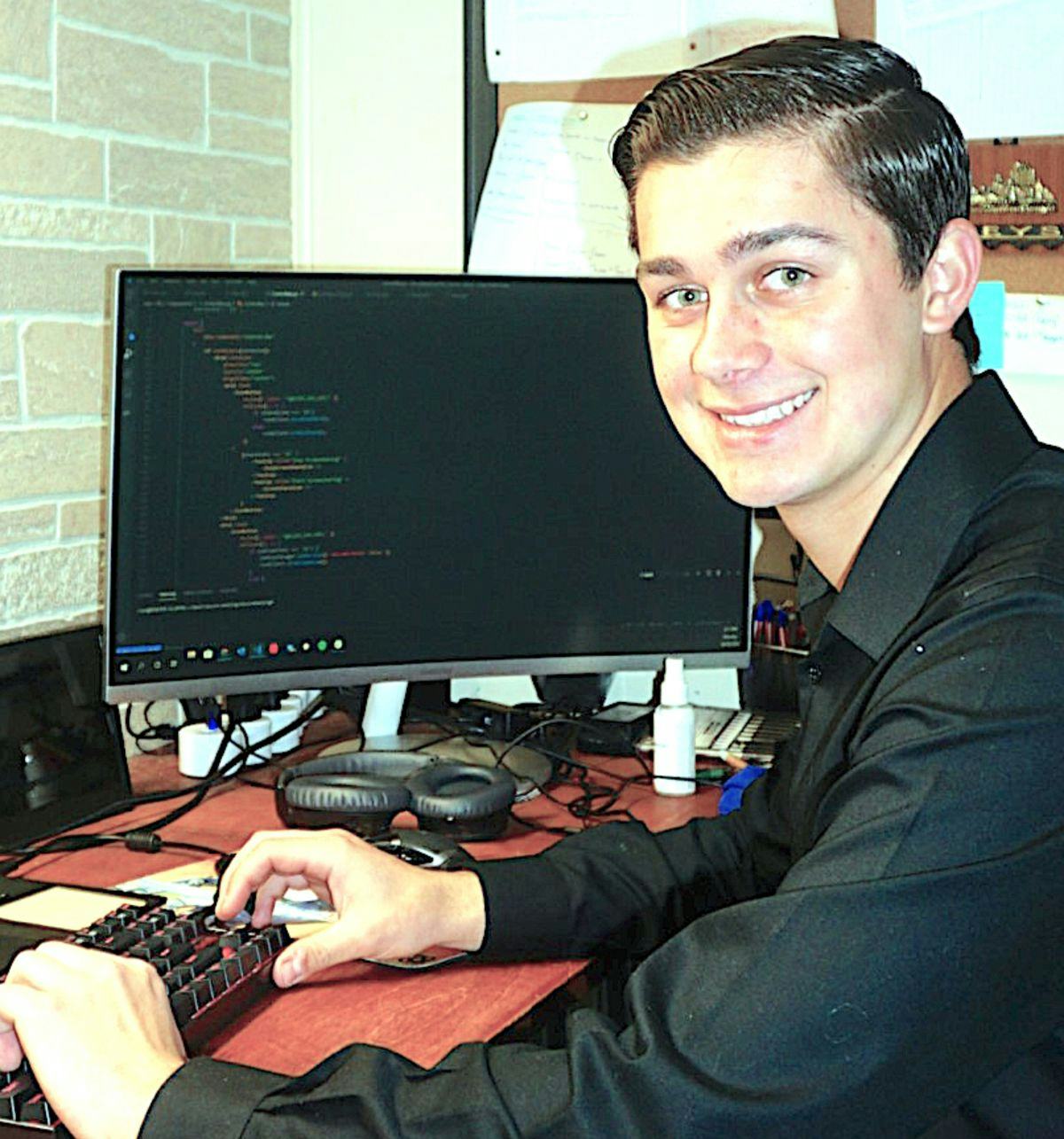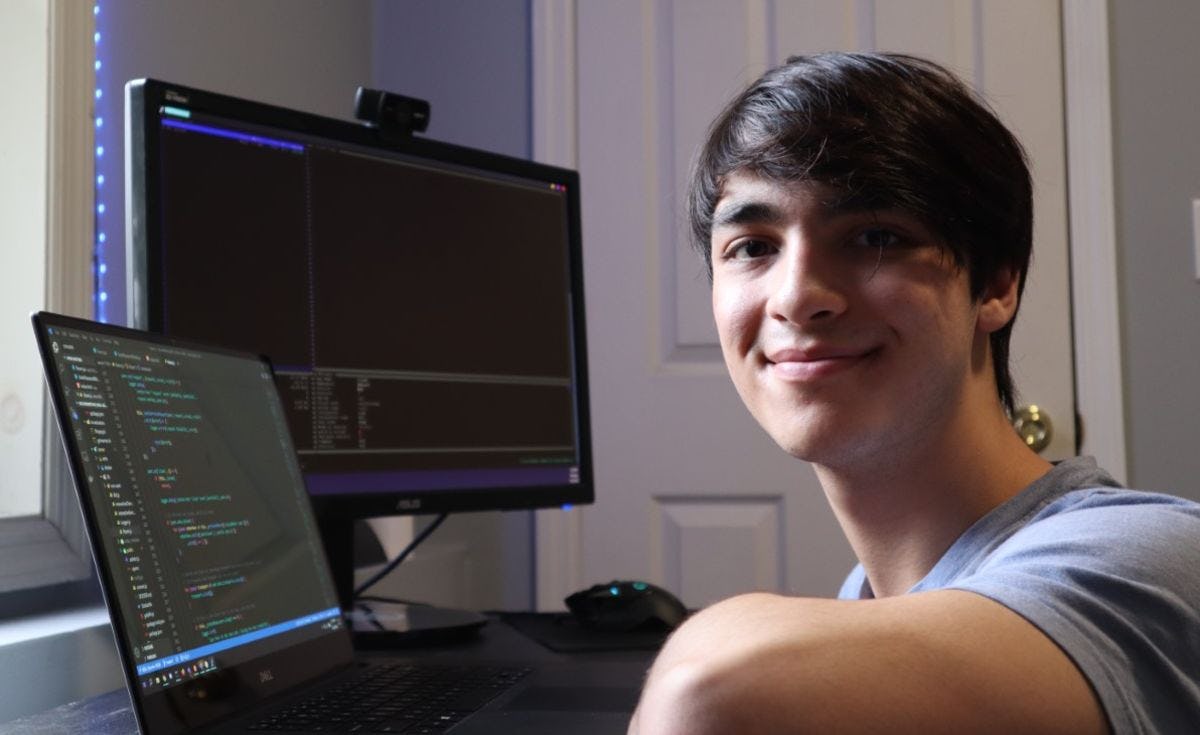Just in Time for a Crisis, Stevens Team Unveils Secure New Videoconferencing Tool
Undergraduates working to enhance remote productivity suddenly thrust into spotlight by COVID-19 pandemic
An 87-year-old grandmother of five, who never got the hang of Skype, clicks a web link on her personal computer and begins chatting with her family of fourteen, for free. An accountant in South Africa shares a link with his clients, who refuse to use Zoom out of security fears, in order to discuss finances. A doctor in the U.S. checks in remotely on a patient's recovery from COVID-19 without exposing herself to the virus.
All are using a new video software tool, SecureMeeting, developed at Stevens and rolled out this week to support remote interactions such as office work and telemedicine during the COVID-19 health crisis.
The video-conference and chat tool was created by a pair of Stevens Institute of Technology sophomores, Andrew D'Angelo and Bryan Kyritz, who accelerated its public release to help cope with the pandemic.
"Many of the other tools available to people — FaceTime, Skype, Google Hangouts, even Zoom on some extent — were caught flat-footed by this crisis," explains professor Mukund Iyengar, who advises the two students as part of the university's 12-month Launchpad program for undergraduate innovation.
"All of them require downloads. All of them require a login and password. All collect and store a great deal of user data, which could be hacked or stolen.
"Imagine a service that collects and stores nothing; if nothing is stored, nothing can be stolen."
No accounts, no downloads, no fees
It's a remarkably quick launch by D'Angelo and Kyritz, computer engineering majors who only began developing the tool in the fall of 2019, then brought to completion with the assistance of iSTEM program sophomores Hayden Daly and Frank Pinnola. (The product builds upon previous work by former iSTEM and Launchpad students Justin Trugman and Charles Bethin, as well.)
"Our original mission," recalls D'Angelo, "was to enable a culture where almost nobody needs to commute to work anymore. "My commute to Stevens is more than one hour, and many employees in the New York and New Jersey are familiar with what I'm talking about. I was losing out on part of my college experience because I was spending so much time in the car."
When the COVID-19 crisis hit, the team quickly saw an opportunity to make a positive difference.
"Just three months ago, we were thinking we were too soon for the market; we felt we would need to take some time and energy convincing people you don't need to pay for meetings, and convincing employers that don't need to see their employees in the office every day," D'Angelo notes.
"Now, suddenly, the virus hits and this technology is needed more than ever. We decided to double down and work through the pandemic."
"We are releasing it now, for free, to get this into the hands of the public more quickly," adds Kyritz.
The new tool, Iyengar notes, makes minimal demands on both the user and the user's computing devices and systems.
"The product is basically invisible," he says. "These students have intelligently designed SecureMeeting so that the entirety of the tool is basically part of your web browser. To use it, you're simply using the web, just as you have always done."
The platform runs right within most browsers thanks to an open-source layer of code known as WebRTC, acquired and further developed by Google a decade ago. The Javascript-based code enables voice and video capabilities on a web page. That means no applications or software are ever downloaded onto users' computers and devices.
SecureMeeting also leverages a second technology, intelligent selective forwarding units, or ISFUs, to conserve data resources. Rather than linking up everyone in a meeting to one another continuously (as peer-to-peer software tools do), each user is connected directly to a central media server — which, in turn, selectively forwards users’ individual media streams to every other user in the live virtual meeting room.
"The benefits include a reduction in user connections and the elimination of needing to encode and decode audio streams as is done in conventional multipoint servers," says D'Angelo.
"The use of ISFUs makes a significant difference in, for example, the transmission bandwidth required," explains Iyengar.
The team also touts additional advantages of the new platform:
No downloads or apps. A mobile application may be developed soon to make connecting even more efficient, but for now the platform works fine in both mobile and desktop environments.
Easier access. Anyone can host or join a meeting anytime, so long as a device is connected to the internet. Even basic devices with smaller amounts of memory can use it.
No accounts. Since there are no accounts, zero personal data is shared with other users or the platform. A small amount of data may be collected anonymously during meetings to monitor and optimize speed and performance, but none is tied to individual users — since there are no user profiles to match with the collected data.
Extra security. Meetings can't be entered except by those with a random, complex link automatically generated by the platform for each event. Connections are also encrypted end-to-end throughout the course of meetings, a feature built into WebRTC code.
What's next? Andrew and Bryan incorporated a company, Cympl.io, in early April. They may eventually add premium features to SecureMeeting for a fee, but that won't happen for awhile yet.
"We hope to do for group videoconferencing what Wikipedia did for knowledge sharing," says Iyengar.
"Ultimately, we want to unite people, so we are making it available to as many as possible right now," agrees Kyritz. "We hope a lot of people will benefit during this crisis."
"When you think about it, livestreaming meeting technologies were basically broken," Iyengar concludes. "YouTube tried, Facebook tried; they largely failed. Zoom is trying, but it has experienced challenges. So this is very exciting to see.
"And it all started with Stevens undergraduate student innovation at Launchpad."


